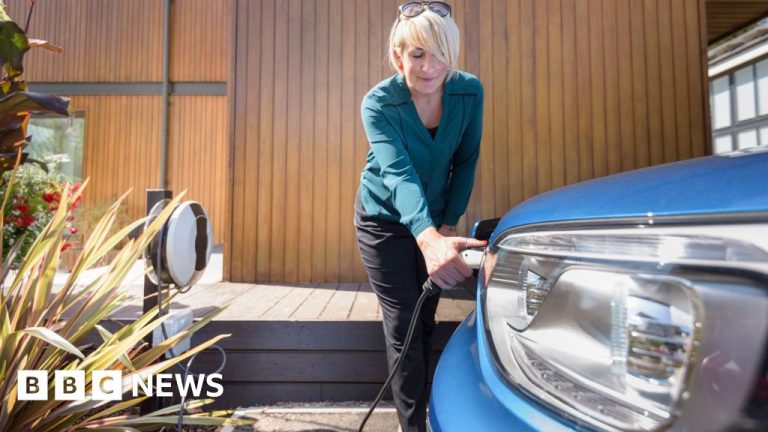One in four cars sold in the UK last month were electric, industry figures show, but new registrations were driven by deep discounts.
Electric car sales rose in November for the 11th consecutive month, according to the Society of Motor Manufacturers and Traders (SMMT), as automakers raced to meet ambitious targets.
Manufacturers have given “massive” discounts worth around £4 billion on electric vehicles (EVs), the SMMT has said.
However, companies will miss government targets for electric vehicle sales this year and will likely have to make huge payments to comply with the rules.
SMMT chief executive Mike Hawes said manufacturers were investing in electric vehicles “at unprecedented levels” and “spending billions on attractive deals”.
But he added: “Such incentives are unsustainable – industry alone cannot achieve the UK’s world-leading ambitions. »
New registrations of electric cars have resisted the general downward trend for other vehicles.
Even though most of the demand for new cars came from fleet sales to businesses, this sector still saw its sales decline overall. Sales from private buyers also fell.
Sales of new petrol cars fell by more than 17%, those of diesel cars by more than 10%, while those of hybrid and plug-in hybrid cars fell by more than 3% and 1% respectively.
The government has promised to meet with automakers to discuss electric vehicle targets. He said the targets “will not be weakened”, but he will discuss “flexibilities”.
Manufacturers have said they will not be able to meet current targets, which call for electric vehicle sales to account for 22% of cars sold in 2024, without more incentives for customers. This figure is currently 18.7% and they believe it could reach 19% by the end of the year.
However, that still leaves them free to pay other manufacturers who have accumulated credits to sell electric vehicles.
Although many of these companies are Chinese or make cars in China – for example the American company Tesla – other automakers can also benefit from credits.
Manufacturers have long argued that it doesn't make sense to subsidize Chinese companies by buying credits.
Earlier this month, Ford and Vauxhall owner Stellantis announced job cuts, both partly linked to electric vehicle targets.
But both companies have already expressed doubts about their future in the UK due to other factors.
Ford closed its Bridgend factory in 2020, cutting 1,644 jobs, citing Covid as one of the reasons. Vauxhall's former owner, the PSA Group, suggested in 2019 that Brexit was threatening its Luton factory.
In general, UK-based companies have embraced the move to electric, with JLR's Jaguar attracting a lot of attention following its recent rebranding as an electric-only carmaker.

